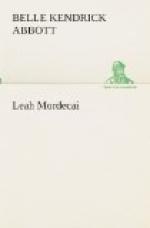“It’s growing late, Miss Leah,” said Emile, who stood near the young Jewess. “May I see you safely home?”
“Thank you, but it is not too late for me to go alone,” she replied; “besides, my walk will lead to my uncle Jacob’s, where I may spend the night; that’s not very far, you know.”
Determined not to be baffled in his purpose to escort Leah, he replied:
“‘The longer the walk, the shorter the way,’ with you, Miss Leah. Allow me to attend you, I pray.” His pertinacity prevailed; and falteringly she replied, “As you like, Mr. Le Grande,” resolving in her heart though, that this should be the last time. “Only this morning,” thought she, “what did I promise Lizzie? And before the day is ended, I have broken that promise. What an irresolute creature I am! But this shall be the last. I vow it again.”
“You will miss Miss Heartwell, I judge,” began Emile, as he walked forward by her side. “From your sorrowful expression, one might think she had died, instead of vanished from sight in a vessel. I trust there are yet some friends in the Queen City; at least one, who will be kindly remembered in the absence of Miss Heartwell.”
“Yes, Mr. Le Grande, I have some friends, a few, I trust, left behind; but no one, not a soul, that can supply her place in my affections. She has been more than a school-friend to me; she has been a counsellor, a sister; one who above all others comprehends my nature and sympathizes with and appreciates my character,” said Leah, warmly.
“Indeed, Miss Heartwell is to be envied in possessing so much of your affection, and yet I think you speak unjustly in attributing to her alone the heart of love and sympathy you do. Have I not told you of my attachment and devotion to you? And do you still require other protestations to confirm the sincerity of my confession?”
At these words-unwelcome words to Leah-she colored deeply, and turning her dark, burning eyes full upon Emile, said:
“Mr. Le Grande, I pray you never let me hear you utter such a sentiment as that again. We are friends, and, if you choose, may always be; but, in all truthfulness I say it, more than friends we can never be. I confess frankly that your society is very agreeable to me, your manner fascinating, your style attractive; but I am a Jewess of the strictest sect, and you a Christian, and not a strict one; and these facts alone form an insurmountable barrier in the way of our being more than friends. A great gulf lies between us, over which even love cannot securely go. You cannot come to me, and I dare not cross to you. It is dishonor to God and disobedience to parents, to think of such a step. Mr. Le Grande, I beg you, forget this passion you profess; crush it out if it exists, and remember Leah Mordecai, the Jewess, as only a friend. Do you promise?” she said, trembling from head to to foot, for it had required all the moral strength of her yielding nature to utter these words-words that could instantly quench the only taper of hope that still burned in her soul.




